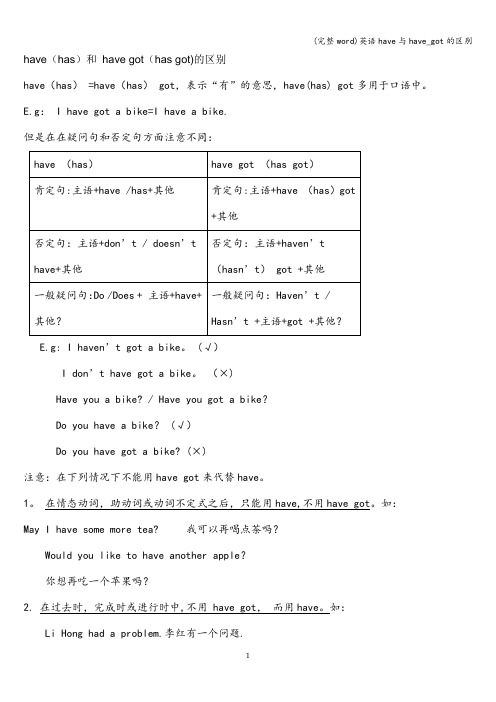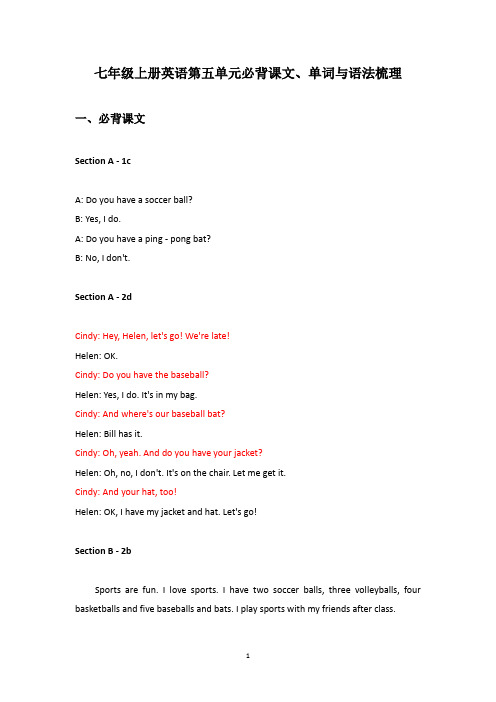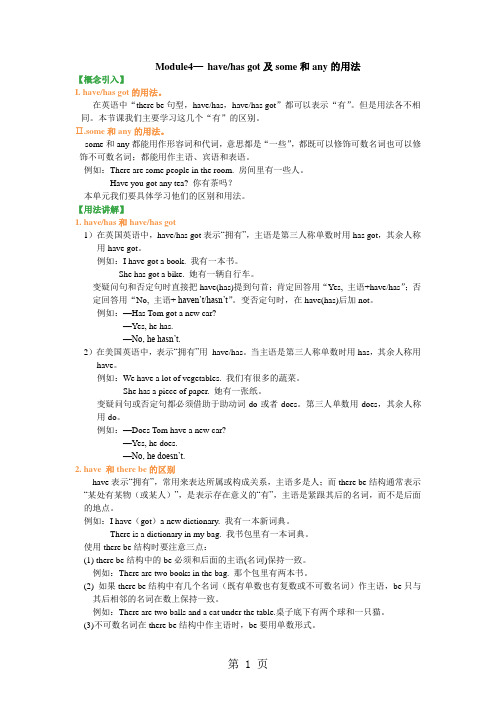4.have got的用法
七年级英语上册module4healthyfood语法篇试题

Module 4语法篇____________________________________________________________________________________________________________________________________________________________________1. 熟练掌握have/has got的用法2. 熟练掌握some, any的用法3. 熟练掌握名词及名词的复数形式一、have/has got 的用法1. have got意为“有;拥有”,如果想表达某人拥有某物,可用句型“主语+have/has got+其他”,其中have有人称和数的变化,当句子主语为第三人称单数或单数名词时,用has got。
当句子主语是其他人称时,用have got。
2. have got的否定形式为:haven’t got或hasn't got。
We haven’t got any juice.我们没有果汁。
3. have got的一般疑问句形式,将have/has提到主语前即可。
---Have you got any carrot? 你有胡萝卜吗?---Yes, I have./No, I haven’t.是的,我有。
/不,我没有。
4. have/has got与there be句型的区别(1)there be句型表示“存在,某地/某时有某人/某物”。
There is a book on the desk. 桌子上有本书。
(2)have got表示“某人拥有某物”,此时是一种所有关系。
She has got a dog. 她有一只狗。
二、some,any的用法some和any 可用作形容词,意为“一些”,在句中修饰名词。
1. some和any既可以修饰可数名词又可以修饰不可数名词,但some常用在肯定句中,而any则常用在否定和疑问句中。
外研版小学英语第十一册知识点综合梳理

Module 11.tell somebody about something 告诉某人关于某事例:tell me about the Great WallCan you tell me about Christmas /the Spring Festival?2.how long 询问物体的长度例:How long is the Great Wall?how old 多久,询问时间长短例:How old is the Great Wall?3.more than 超过例:It’s more than forty thousand li long.It’s more than two thousand years old.(注意year在此处用复数形式)It’s more than four hundred metres high!(注意metre在此处用复数形式)4.the Empire State Building 帝国大厦5.office building 办公大楼注意:一座办公大楼an office building Module 2(本章重点:单词的过去式和如何去叙述一件已经发生过的事情)1.somebody be going to do something 某人打算去做某事例:I’m going to send an email to Mum.2.涉及到过去式的单词:yesterday, last Monday(上周一),last night(昨晚),two daysago(两天之前)……例:I went to Chinatown in New York yesterday.I went to a library yesterday.I wrote a story in English class yesterday.We went to the Ming Tombs yesterday.I did my homework last night.We saw a lion dance in the street.3.have a surprise 吃惊4.there be 结构,表示“有”例:There were Chinese people everywhere.There were lots and lots of Chinese shops and restaurants.There are lights in the street.5.be different from 与……不同例:The food was different from Chinese food in China.Module 3知识点: a +名词单数形式例:Have you got a book about the US?1.have you got你有……吗?any +名词复数形式例:Have you got any stamps from China?(注意stamp在此处用复数形式) 相应的肯定回答:Yes, I have. 相应的否定回答:No, I haven’t.2.have got和has got d的用法区别:(1)当只有一个人时,用has got. 特殊情况:you, I用have got例:Lucy has got a book.My brother has got a Chinese kite.I’ve got some Chinese chopsticks.You have got a book about the US.(2) 当有两个及两个以上的人时,用have gotWe have got some books about the US.3.Somebody be doing something 某人正在做某件事例:I’m putting my new stamps into my stamp book.(此处注意两个stamp的单复数形式) I’m learning English.(1)put something into somewhere 把某样东西放进某个物体里面例:put my new stamps into my stamp book4.注意“集邮“的表述方式:collect stampsCollecting stamps is my hobby.5. a picture of 一张…的照片例: a picture of Hainan Islanda picture of my friend6.the Five-Finger Moutain 五指山Module4:1.something is important to somebody(人称的宾格形式) 某件事对于某人来说很重要例:Thanksgiving is important to us in the US.2.介词in和on 的区别:(1)具体到某年某月的某一天:用on例:on the 25th of DecemberWhat do you do on Thanksgiving?(答:We always have a big, special dinner.)(2)只是具体到某年或是某月:用in例:in 2016 in November3.介词for:表示“因为“d的时候,例:We say ‘thank you’ for our food, family, and friends.Thank you for your help.4.have fun 过得开心例:We have a lot of fun.5.注意表述方式:give presents送礼物send cards 寄贺卡Module 5:1.write to somebody(人称的宾格形式) 给某人写信例:write to her/him/them/you/us2.介词in:表示用什么语言例:in Chinese in English in French ……3.can+动词原形:例: She can speak some English.You can write to her in English.4. Can somebody do something 某人能/可以做什么事情吗?例:Can I write to her?(答: You can write to her in English.)5. be from =come from 来自I ’m from China=I come from China.He is from China = He comes from China.6. pleased =glad=nice例:Pleased to meet you= Glad to meet you= Nice to meet you.7关于want 的用法:后跟名词:I want a Chinese pen friend. She wants an American pen friend.I want a pen friend.I want new friends from China=I want Chinese new friends. 后跟动作:want to do (动词原形) 例: Do you want to hear it?Do you want to climb the stairs to the top?拓展:want to be 想成为例:I want to be a teacher.She wants to be a writer.(作家)Do you want to be my pen friend?Module6知识点:1. h ave got 的用法:M3知识点1已提,不赘述。
have got的适当形式

have got的适当形式
"have got" 是 "have" 的现在完成时的形式,表示拥有或具有某种特征或状态。
它的适当形式取决于句子的主语和时态。
下面是一些例子:
1. 现在时,I have got a new car.(我有一辆新车。
)。
2. 过去时,She had got a headache yesterday.(她昨天头疼。
)。
3. 现在进行时,They are having got some problems with the project.(他们在处理这个项目时遇到了一些问题。
)。
4. 现在完成时,We have got enough time to finish the task.(我们有足够的时间来完成任务。
)。
需要注意的是,在正式的英语写作中,"have got" 通常可以简化为 "have" 或 "has",因此并不是所有情况下都需要使用 "have got"。
Module4语法对比havegot与therebe句型英语七年级上册

have got 与there be句型(含练习及答案)"have got" 是一种常见的口语表达方式。
如果说there be 句型表示“某地方有某物或某人”,那么have got 则表示“某人有某物”。
➢含义:"have got" 的含义是"拥有" 或"有"。
它可以用来描述某人所拥有的事物或某人所处的状态。
➢用法:1. 描述拥有的事物:I have got a new car.(我有一辆新车。
)She has got two cats.(她有两只猫。
)2. 描述某人的状态:They have got a headache.(他们头疼。
)He has got a cold.(他感冒了。
)➢搭配:1. "have got" 可以与具体的名词连用,表示拥有某个特定的物品。
She has got a beautiful house.(她有一所漂亮的房子。
)2. "have got" 也可以与抽象名词连用,描述某人的状态或特征。
They have got a busy schedule.(他们的日程安排很忙。
)3. 如果表达“他,她”有,则要用has got,而“我们,你(们),他们”等与“我”一样,用have got。
He has got two sisters. 他有两个姐姐/妹妹。
She has got a very nice bike. 她有一辆很棒的自行车。
They have got many friends. 他们有很多朋友。
We have got a puter. 我们有一台电脑➢形式:1. 肯定句形式:主语+ have/has + got + 宾语I have got a new phone.(我有一部新。
)She has got a big garden.(她有一个大花园。
小学语法 Have got 和Has got 的用法

have\has got的用法Have got\has got和have\has的区分1.在只含有have\has的句子中,变否定句及疑问句要用do\does。
I have a pen. 否:I don't have a pen. 问:Do you have a pen?He has a pen. 否:He doesn't have a pen. 问:Does he have a pen?2.在句子中遇到have\has got 时,直接用have \ has 进行句型转换。
I have got a pen. 否:I haven't got a pen. 问:Have you got a pen?He has got a pen. 否:He hasn't got a pen. 问:Has he got a pen?一、用have got或has got填空。
1.I ________ a cat.2.He __________ a dog.3.She __________ long hair.4.We __________ a big house.5.They __________ a happy family.6.It __________ a short tail.7.You __________ a good teacher.8.Elva __________ two big eyes.9.Tom __________ a red pen.10.My mother __________ a beautiful nose.11.Cats __________ four legs.12.Dogs __________ two ears.二、have got 和 has got 的否定形式填空1. Lisa __________ a lovely cat.2. We __________ a beautiful garden.3. They ___________ many books.4. Miss Green ____________ big eyes.5. I __________ a turtle. My sister ____________ a turtle, too.6. My father and mother ___________ a nice house.7. My father ______________ a red shirt.8. You __________ a large apple.9. The girl ____________ three uncles.10. The girls ____________ three uncles.三、have got 和 has got 的一般疑问形式填空1. ________ you ________ a red dress? No, I ____________ a blue dress.2. ________ Tom _______ two aunts? Yes, he ___________ two aunts.3. ________she ____________ a small dog?4. The dog is lovely. ________it ___________ a small nose and big eyes?5. ________Mary ____________ a pet. Yes,she________a cat?6. ________the dog ____________ a big mouth? No, it________.7. ________Tom and I________ a football? Yes,we ________.8. ________your sisters________ big eyes? No,they ________.9. ________they ________ five trains? No, they ________.10.________he ________ a big bedroom? Yes, he ________.四、句型转换。
(完整word)英语have与have_got的区别

have(has) =have(has) got,表示“有”的意思,have(has) got多用于口语中。
E.g: I have got a bike=I have a bike.
但是在在疑问句和否定句方面注意不同:
have (as)
have got (has got)
E.g:I haven’t got a bike。 (√)
I don’t have got a bike。 (×)
Have you a bike? / Have you got a bike?
Do you have a bike? (√)
Do you have got a bike? (×)
注意:在下列情况下不能用have got来代替have。
Li Hong had a problem.李红有一个问题.
I have had the bike for three years.
我买这辆自行车已经3年了。
3.固定短语中不用have got。
have a rest/ a swim/ a wash/ a drink
have lunch, have a meeting, have a party
1。在情态动词,助动词或动词不定式之后,只能用have,不用have got。如:
May I have some more tea?我可以再喝点茶吗?
Would you like to have another apple?
你想再吃一个苹果吗?
2.在过去时,完成时或进行时中,不用 have got, 而用have。如:
肯定句:主语+have /has+其他
have,hasgot句型

Lesson Four Have/has got句型Have/has got句型表示某人有某物,have/has 为助动词,无实际意义。
1.当主语是I, you和复数主语时用have got. 2.当主语是单数主语时用has got. 3.变成否定句时在have/has后加n’t. (句中有some变any)4.变成一般疑问句时将have/has提于句首。
(句中有some变any, I变you, my变your)一.用have got, has got, haven’t got, hasn’t got填空1. I a toy car. 2. I any pencils. 3. He a lot of balls. 4. My father any newspapers. 5. she glasses? 6. you a new bag? 7. She any matches. 8. Lily a computer. 9. It a long tail. 10. he got a car? 二.按要求改写句子1. I have got a big ice cream.(变成一般疑问句并做出肯定回答) 2. She has got a skirt.(变成否定句) 3. He has got some English books.(变成一般疑问句并做出否定回答) 4. I have got some mats.(变成否定句) 5. It has got long ears.(变成否定句) 三翻译句子1.我们有许多书。
2.他的爸爸没有一些茶。
3.你有一个书包么?你有一个书包么?4.Tom有一些铅笔在文具盒里。
有一些铅笔在文具盒里。
5.Eric 和Alice有一些橘子。
有一些橘子。
人教版七年级(初中一年级)上册英语第四单元必背课文、单词与语法梳理汇总

七年级上册英语第五单元必背课文、单词与语法梳理一、必背课文Section A - 1cA: Do you have a soccer ball?B: Yes, I do.A: Do you have a ping - pong bat?B: No, I don't.Section A - 2dCindy: Hey, Helen, let's go! We're late!Helen: OK.Cindy: Do you have the baseball?Helen: Yes, I do. It's in my bag.Cindy: And where's our baseball bat?Helen: Bill has it.Cindy: Oh, yeah. And do you have your jacket?Helen: Oh, no, I don't. It's on the chair. Let me get it.Cindy: And your hat, too!Helen: OK, I have my jacket and hat. Let's go!Section B - 2bSports are fun. I love sports. I have two soccer balls, three volleyballs, four basketballs and five baseballs and bats. I play sports with my friends after class.I love sports, but I don't play them - I only watch them on TV! I like to watch soccer games. Soccer is difficult. I like ping - pong. It's easy for me. I have three ping -pong balls and two ping -pong bats. After class, I play ping -pong with my classmates.二、重点单词1. have:[hæv] v.(第三人称单数形式has)有;吃;喝;经受;经历2. soccer:[ˈsɒkə(r)] n. 足球3. ball:[bɔːl] n. 球;舞会4. soccer ball:足球5. tennis:[ˈtenɪs] n. 网球6. tennis ball:网球7. ping - pong:[ˈpɪŋ pɒŋ] n. 乒乓球8. volleyball:[ˈvɒlibɔːl] n. 排球9. basketball:[ˈbɑːskɪtbɔːl] n. 篮球10. do:[duː](第三人称单数形式does)aux. (用于构成否定句和疑问句等);v. 做;干;构成否定句、疑问句的助动词11. let:[let] v. 让12. us:[ʌs] pron.(宾格)我们13. let's = let us:让我们14. go:[ɡəʊ] v. 去;走;离开;变得;进行15. we:[wiː] pron. 我们(主格)16. late:[leɪt] adj. 迟到;晚的;adv. 晚;迟17. has:[hæz] v. (have的第三人称单数形式)有18. get:[ɡet] v. 去取(或带来);得到;收到;变成;购买;到达19. great:[ɡreɪt] adj. 美妙的;伟大的;很棒的;重大的20. play:[pleɪ] v. 参加(比赛或运动);玩耍;演奏;播放;n. 戏剧;剧本21. sound:[saʊnd] v. 听起来好像;发出声音;n. 声音;音响22. interesting:[ˈɪntrəstɪŋ] adj. 有趣的23. boring:[ˈbɔːrɪŋ] adj. 没趣的;令人厌烦的24. fun:[fʌn] adj. 有趣的;使人快乐的;愉快的;n. 乐趣;快乐;玩笑;娱乐活动25. difficult:[ˈdɪfɪkəlt] adj. 困难的;费力的;艰难的26. relaxing:[rɪˈlæksɪŋ] adj. 轻松的;令人放松的27. watch:[wɒtʃ] v. 观看;注视;看守;监视;n. 表;手表28. TV:[ˌtiː ˈviː] n. 电视;电视机(television的缩写)29. same:[seɪm] adj. 相同的;同一的;pron. (和……)同样的事物(或人)30. love:[lʌv] v. 爱;喜欢;n. 爱;热爱;慈爱;爱情31. with:[wɪð] prep. 和……在一起;带有;使用;以;由于32. sport:[spɔːt] n. 体育运动;(某项)体育运动;v. 炫耀;夸示33. them:[ðəm] pron.(宾格)他们;她们;它们三、语法知识点1. 一般现在时(have的用法)-have表示“有”的用法:have在一般现在时中,当主语是第一、二人称(I、you、we、you、they)以及复数名词时,用原形have,如:I have a book.(我有一本书。
Module 4【刷语法】have got句型和名词的数(重点语法提升练)-2024-2025学年七

2024-2025学年七年级英语上册单元模块满分必刷题(外研版)Module 4 Healthy food【刷语法】(重点语法提升练)have got句型和名词的数一、have got句型用法:have got在句子中作谓语,随着句子主语的变化而变化。
主语是第三人称单数he,she或it 时用has got其余人称I, we,you或they用have got肯定句:某人+have/has got+其他She has got a new coat.她有一件新外套。
They have got some new computers.他们有一些新电脑。
否定句:在have/has 后直接加notHe hasn't got a new coat.他没有一件新外套。
They haven‘t got any new computers.他们没有新电脑。
一般疑问句:Have/Has+某人+got+其他?肯定回答:Yes,主语+have / has.否定回答:No,主语+haven't / hasn’t.Mary has got some meat.—Has Mary got any meat? — /—Have Mary and Tom got a new computer?—Yes, they have. No, they haven’t.注意:have/has got 表示所属关系,意为拥有,主语是人或机构、组织等;there be句型表示存在,即某地存在某物或某人,主语是be动词后的名词或代词。
/二、名词的数可数名词变复数1.规则变化2.例外情况1)以ch 结尾加s 的英语单词:stomach—stomachs2)以f 结尾直接加s 的英语单词:roof—roofs gulf—gulfs belief—beliefs staff—staffs chief—chiefs proof—proofs3)以f 结尾两种变法都可的单词:scarf—scarfs / scarves dwarf—dwarfs / dwarveshandkerchief—handkerchiefs / handkerchieves3.不规则变化1)单复数相同sheep deer fish2)a 变成e man woman Englishman Frenchman3)oo 变成ee foot tooth goose4)中日不变英法变,其余s 加后边;German德国人,其复数形式为Germans5)特殊变化child—children ox — oxen mouse—mice4.三个注意1.英语中一些由两个部分组成的物体名词通常是以-s 结尾,如:pants,trousers,shorts,shoes,scissors,glasses 等。
Module4 语法精讲精练(havehas got及some和any的用法)-精选学习文档

Module4—have/has got及some和any的用法【概念引入】I. have/has got的用法。
在英语中“there be句型,have/has,have/has got”都可以表示“有”。
但是用法各不相同。
本节课我们主要学习这几个“有”的区别。
Ⅱ.some和any的用法。
some和any都能用作形容词和代词,意思都是“一些”,都既可以修饰可数名词也可以修饰不可数名词;都能用作主语、宾语和表语。
例如:There are some people in the room. 房间里有一些人。
Have you got any tea? 你有茶吗?本单元我们要具体学习他们的区别和用法。
【用法讲解】1. have/has和have/has got1)在英国英语中,have/has got表示“拥有”,主语是第三人称单数时用has got,其余人称用have got。
例如:I have got a book. 我有一本书。
She has got a bike. 她有一辆自行车。
变疑问句和否定句时直接把have(has)提到句首;肯定回答用“Yes, 主语+have/has”;否定回答用“No, 主语+ haven’t/hasn’t”。
变否定句时,在have(has)后加not。
例如:—Has Tom got a new car?—Yes, he has.—No, he hasn’t.2)在美国英语中,表示“拥有”用have/has。
当主语是第三人称单数时用has,其余人称用have。
例如:We have a lot of vegetables. 我们有很多的蔬菜。
She has a piece of paper. 她有一张纸。
变疑问句或否定句都必须借助于助动词do或者does。
第三人单数用does,其余人称用do。
例如:—Does Tom have a new car?—Yes, he does.—No, he doesn’t.2. have 和there be的区别have表示“拥有”,常用来表达所属或构成关系,主语多是人;而there be结构通常表示“某处有某物(或某人)”,是表示存在意义的“有”,主语是紧跟其后的名词,而不是后面的地点。
词法--have-got的详细用法

Have got专项练习复习:have的用法及否定句、一般疑问句的变法。
①have 的意思是:________ ,它的单三形式是: _______ 。
have 是________ 词。
例如:我有许多好朋友。
_____________ many good frien ds. 他有许多好朋友。
_____________ many good frien ds.②把下列两道题改为否定句:1、I have many good friends : _________________________________总结:have的句子改为否定句要2、He has a dog : ____________________________ 总结:has的句子改为否定句要同样的道理:请将下列两道题改为一般疑问句:I have many good friends : _________________________________ 总结:He has a dog : __________________________ 总结:练习:一、用have的正确形式填空:1He two brothers.2、I a beautiful picture.3、Betty a lovely dog.4、They some friends here二、请将下列的句子改为否定句和一般疑问句。
1-3 题改为否定句:1、He has two brothers. ____________________________________________________ 2、______________________________________________________________________________ I have a beautiful picture. ___________________________________________________________________3、_________________________________________________________________________________ Betty has some friends here. __________________________________________________________________4-6 题改为一般疑问句:4、They have a good teacher. __________________________________ 肯定回答:___________________5、_______________________________________________________________ I have some cards.否定回答:____________________________________________________6、Tony has a sister. _________________________________________ 否定回答:_____________________三、请用所给词的适当形式填空。
〖2021年整理〗总结have got的用法

复习总结have got的用法
通过对比理解have got 的用法:
例句:I’ve got a new ite I thin I have got one.
解析
1、现在完成时结构have got在口语中相当于一般现在时have的意义,表示“有”。
不过,在美国英
语中常用have,而在英国英语中则常用have got。
例:他有一个兄弟。
He ha got a brother.(英式)=He ha a brother.(美式)
2、在问句方式上,have got现在完成时结构只有一种疑问方式,即:Have/Ha...got...
而have一般现在时结构有两种疑问方式,即:Do/Doe...have...或Have /Ha...
你有一把雨伞吗?
①Have ou got an umbrea
②Do ou have an umbrea
③Have ou an umbrea
注意: 这两种结构疑问句的回答略有不同。
①—Have ou got a dictionar
—Ye,I have./No,I haven't.
②—Do ou have a dictionar
—Ye, I do./No, I don't.
考点链接
1.Do ou have a motorbie?(同义句)→____ou ___a motorbie
2.I don't have a mobie uter
Ke:1.Have,got 2.haven't got 3.got。
外研版七年级英语上册Module 4 Unit 3

二、可数名词和不可数名词 (一)、可数名词有单数、复数之分,如: map → maps 不可数名词没有复数形式,只有单数形式。如: some water (二)、单数可数名词表示泛指时,前面要用不 定冠词 a (an) ;而不可数名词不能用 a (an) . 如:Li Hong is a driver. I am a teacher. 李红是一名 司机,我是一名教师。 We can't see milk on the table. 我们看不见桌上 有牛奶。 [ 友情提醒 ] 在表示特指时,不可数名词和可数名词 前都要用定冠词 the .如: Pass me the ball, please. 请把球传给我。
Module 4 Healthy food
Unit3 Language in use
Objectives: 1. To summarise and consolidate the structure have/has got and the use of some and any. 2. To distinguish countable and uncountable nouns 3. To use singular and plural nouns correctly
【拓展】there be (有)与 have/has got(有)的区别: • there be表示“某个地方有某 人或某物”,表示的是“存 在”;而have/has got表示的 是“某人所有”。如; I have got a
new textbook. • There is a new textbook on the desk. • We have got a computer room. • There is a computer room next to our
外研版英语七年级上册Module 4 语法学习 (have got 和 名词)

e.g.
I have got a new book. 我有一本新书。 There is a new book on the desk. 桌子上放着一本新书。
3) 含有have / has got的肯定句变为一般 疑问句时,只须将have或has提前到句首; 其肯定回答为: Yes, 主语(人称代词)+have / has.。 否定回答为: No, 主语(人称代词)+haven’t / hasn’t.。
可数名词 :可按数目计算,有单数和复数两 种形式。单数名词可与不定冠词a或an连用, 数量超过1时要用复数。
fish可作动词,意思是“钓鱼;捕鱼”。 e.g. My father and my brother like to fish. 我爸爸和我哥哥喜欢钓鱼。 写出下列句子中fish的词性和汉语意思。 (1) There are lots of fish in this pond. ______________ n. 鱼 v. 钓鱼 (2) Betty’s brother can fish. ____________ (3) I like eating rice with fish for lunch. n. 鱼肉 _____________
chicken (鸡肉), juice (果汁), Coke (可
乐), ice cream (冰淇淋) 等。
2) 抽象名词是指表示动作、状态、
品质、感情等抽象概念的词。
e.g. work (工作), homework (作业)
专题三 Have(has) got

专题三Have/has got一、Have/has got的用法1.定义Have/Has got句型:它表示某物归某人所有,是一种所属关系,主语为人,只有“拥有”的意思。
转换:have got=have has got=has二、Have/Has got句型的转换A、否定句:在Have或Has后加not, 缩写为Haven’t或Hasn’t.如:I have got three sisters. → I haven't got three sisters.He has got a bik e. → He hasn't got a bike.B、一般疑问句与回答:把Have或Has提前到句首I have got three sisters. → Have you got three sisters? Yes,I have./No,I haven't.He has got a bike. → Has he got a bike? Yes, he has./No, he hasn't.二、Have的用法:1.Have的意思为“有”,其单数三人称形式为has.2.句型转换A. has:肯定句:He has a big dog.否定句:He doesn’t hasn't a big dog.一般疑问句:Does he have a big dog?(前面用了does后面就用have的原形)Yes, he does./ No, he doesn't.B. have:肯定句:They have a big dog.(have用于除第三人称单数之外的其他情况)否定句:They don’t have a big dog.一般疑问句:Do they have a big dog? Yes, they do. / No, they don't.总结:在只含有have的句子中,变否定句在have前加don’t,其余不变。
- 1、下载文档前请自行甄别文档内容的完整性,平台不提供额外的编辑、内容补充、找答案等附加服务。
- 2、"仅部分预览"的文档,不可在线预览部分如存在完整性等问题,可反馈申请退款(可完整预览的文档不适用该条件!)。
- 3、如文档侵犯您的权益,请联系客服反馈,我们会尽快为您处理(人工客服工作时间:9:00-18:30)。
4. have got & has got
一.选择正确的答案
1.I _____ three books. A. have got B. has got
2.We _____ many friends. A. has got B. have got
3.They _____ two pets. . A. have got B. has got
4.She _____ a new pencil. A. has got B. have got
5.He _____ a train toy. A. have got B. has got
6.The pig _____ two ears. A. has got B. have got
7.It _____ two red eyes. A. have got B. has got
8.You _____ a blue skirt. A. has got B. have got
二.回答下列问题
1. Have you got a pen? Yes,______________ No, _______________
2. Has she got long hair? Yes,______________ No, _______________
3. Have we got English class today? Yes,______________ No, _______________
4. Has Tom got brown hair? Yes,______________ No, _______________
5. Have they got a new house? Yes,______________ No, _______________
6. Has it got a short tail? Yes,______________ No, _______________
7. Has the cat got a nose? Yes,______________ No, _______________
8. Has he got a younger sister? Yes,______________ No, _______________
三.选词填空,并判断句子是(T)否(F)
I (have / has) got many foreign friends. Tom is from America. He (has / have) got brown hair and black eyes. He (has / have) got a pet dog. Mary is from England. She (has / have) got golden hair and blue eyes. She (has / have) got a pet cat. And I (have / has) got a pet bird. We all like pets.
()1.I have got may friends.
()2.Tom is from England.
()3.He has got brown hair.
()4.Tom has got a pet dog.
()5.Mary is from America.
()6.She has got blue eyes
( ) 7.Mary has got a pet bird.。
